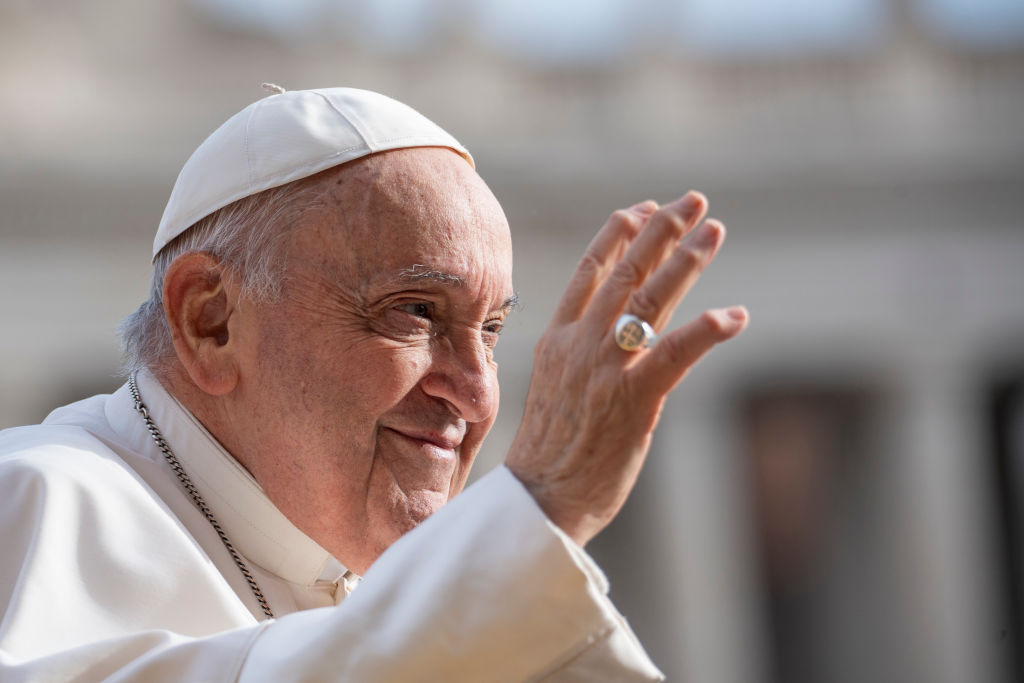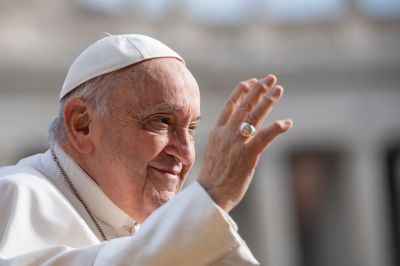Pope Francis came out strongly against gender theory and sex-reassignment efforts in a hard-hitting document released last week. Meant to coincide with last December's 75th anniversary of the U.N.’s Universal Declaration of Human Rights, the pope’s declaration lists the effects of modern gender theory alongside abortion, euthanasia, and even war, as one of the most dire threats to human dignity at play in the world today.
With Dignitas Infinita, or “Infinite Dignity,” the Vatican issued a strident critique concerning threats to the dignity of the human person, reiterating the Catholic Church’s opposition to abortion and euthanasia, and reinforcing its position that the death penalty cannot be morally prescribed in today’s world, as well as the pope’s position on the treatment of migrants. The document even attempts, in some parts, to take a more pastoral—and some might argue, conciliatory—approach to LGBT rights, a difficult circle to square, given that the church is unlikely to alter its position against same-sex marriage or relationships any time soon.
But Pope Francis drew a bold line against gender theory, excoriating the trend of providing body- or mind-altering treatments, particularly to minors, to alleviate gender dysphoria. He decried the practice of changing the human body based on a subjective determination of personal “truth” rather than respecting each individual’s body as “a marvelous gift from God.”
Left-leaning Catholics may have hoped for a less declarative position on gender theory; after all, the Vatican just last year affirmed that transgender individuals—even those who have been through a sex-change process—may serve as Catholic godparents. And back in December, in a confusing document that laid bare cultural and liturgical rifts between Western Catholics and those in Africa and Asia, the pope’s chief theologian suggested that while same-sex relationships themselves could not be blessed, persons in those relationships could receive blessings individually and at the same time.
But it makes sense for Pope Francis to clarify the church’s position during a culturally turbulent age. Sex and gender, and from there, marriage, are an integral part of the church’s teaching on the dignity of the human person. As individual thoughts of God—descendants of Adam and Eve, the original man and woman, created in the image of God—Catholics believe we are not the work of chance as God Himself makes no mistakes. We are created to be precisely who we are—and that includes our biological sex, as well as how we experience our gender in a more cultural sense.
Marriage, it follows, is then more than just a physical and emotional union, but a necessarily mystical and spiritual one—the union of two unique individual thoughts of God, ordained to participate with God in the process of creation, that is, making children.
When Catholics speak of the dignity of the human person, we’re often talking about bioethics. Abortion is an affront to dignity because of its assault on a human person; fetal stem cell research, assisted reproduction technology, and surrogacy are similarly problematic because of the morality—or amorality—involved in viewing human life as a consumer product.
In Dignitas Infinita, though, Pope Francis isn’t interested in what’s ethical. He wants to communicate what’s simply impossible.
“Regarding gender theory, whose scientific coherence is the subject of considerable debate among experts, the Church recalls that human life in all its dimensions, both physical and spiritual, is a gift from God,” Pope Francis says. “The gift is to be accepted with gratitude and placed at the service of the good. Desiring a personal self-determination, as gender theory prescribes, apart from this fundamental truth that human life is a gift, amounts to a concession to the age-old temptation to make oneself God, entering into competition with the true God of love revealed to us in the Gospel.”
The debate, the pope says, risks denying “the greatest possible difference that exists between living beings: sexual difference,” and puts human dignity itself at risk. Gender theory, he notes, “identifies dignity with an isolated and individualistic freedom that claims to impose particular subjective desires and propensities as ‘rights’ to be guaranteed and funded by the community.”
Who you believe you are, therefore, is not who you are. Who you are is who God made you. Our inherent human dignity is a product of our creation, not a product of our own understanding of what makes us feel “right” or “correct.” Our “truth,” is not the Truth.
Pope Francis’ idea here is decidedly countercultural. So often we are told to live our truth, express our truth—a common theme among religious authors like Rachel Hollis and Glennon Doyle, as well as a mantra for pop culture figures like Oprah Winfrey—as if our subjective beliefs and feelings take priority over the immutable and the axiomatic and the divine.
“It follows,” he goes on to say, “that any sex-change intervention, as a rule, risks threatening the unique dignity the person has received from the moment of conception.” The body is “the living context in which the interiority of the soul unfolds and manifests itself.”
The dignity of the human person, then, is the dignity of the whole person: not simply the soul, but the body as well. This is the body that God has given you as a person, and the body cannot be changed to align with a person’s will.
“Gender theory,” it appears the pope concludes, is an all-out subjectivist assault on our very nature as humans and a dangerous front in a larger war on objective truth and on an objective view of what constitutes a “human right,” particularly given that gender transitions and “confirmations” are now routinely referred to as “transgender rights” and “human rights” by groups like Human Rights Watch.
He considers it such a danger to humanity the pope puts it alongside not just abortion and euthanasia—the two most typical issues paired with the church’s exhortations on human dignity—but also alongside sex trafficking, the mistreatment of migrants, and war.
A person need not be Catholic, or an adherent of papal doctrine, to see that what Pope Francis notes in the abstract appears to be coming to fruition, almost in real time.
Notably, the pope’s exhortation debuted the same week as a multifaceted review of gender-based care for children in the United Kingdom, which called into question a “culture of secrecy and ideology” surrounding how gender dysphoria and other related concerns are handled by the U.K.’s National Health Service. The report was conducted by Dr. Hilary Cass, a widely respected British pediatrician and former president of the Royal Academy of Pediatrics and Child Health.
The Cass Review found that minors, especially minors starting puberty, were repeatedly “let down” by adult providers charged with treating them for both mental and physical ailments. Doctors and health care providers, Cass found, had cultivated a “culture of secrecy” that treated children first and asked questions later, without a complete understanding of how puberty blockers and other treatments would impact these same children in the long term.
In addition, Cass found a culture of intimidation and fear, as doctors who objected to the new treatments cowered from colleagues and silenced themselves in the face of providers who valued “ideology over evidence and safety.”
Cass’ findings underscore the pope’s prediction of a religion of the individual, with gender ideology among its sacred dogma, and vulnerable children and families struggling with these critical issues among its sacrifices. The consequences in the U.K. are so dire that former government officials told the BBC they believe a “no holds barred” investigation is in order.
The Cass Review seems to suggest that the U.K. will follow in the footsteps of Denmark and other European countries in dropping support for gender affirmation and confirmation therapies. Denmark, which was once a leader in offering treatments for children with gender dysphoria, has since greatly limited its support for providing children and young teens with hormone therapy.
The Vatican plans to extrapolate on the issue of gender theory further, and indications are that Pope Francis may be speaking more pointedly on the issue in the next several months, as the Vatican has commissioned global studies on the subject. As with other issues of human dignity, he’s uniquely positioned to offer a critical viewpoint, as the head of a church that stands nearly alone among major Christian denominations in both its longstanding—and unlikely to shift—dogma on the matter, and its unflappable commitment to human dignity.






Please note that we at The Dispatch hold ourselves, our work, and our commenters to a higher standard than other places on the internet. We welcome comments that foster genuine debate or discussion—including comments critical of us or our work—but responses that include ad hominem attacks on fellow Dispatch members or are intended to stoke fear and anger may be moderated.
With your membership, you only have the ability to comment on The Morning Dispatch articles. Consider upgrading to join the conversation everywhere.